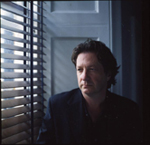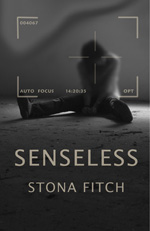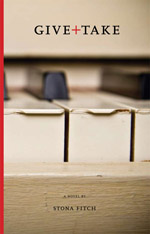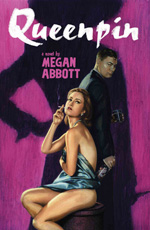- Welcome
- Noir Zine
- Allan Guthrie
- Books
"...those who enjoy the darker side of the genre are in for some serious thrills with this..."
Laura Wilson, The Guardian

Published in the UK by Polygon (March 19th, '09) and in the US by Houghton Mifflin Harcourt (Nov '09).
STONA FITCH
by Megan Abbott

 Megan Abbott: Senseless has had many lives and many forms, including a recent UK publication and adaptations as a graphic novel and a film. What about it do you think inspires such longevity? Do you think there's a particular visual quality to it?
Megan Abbott: Senseless has had many lives and many forms, including a recent UK publication and adaptations as a graphic novel and a film. What about it do you think inspires such longevity? Do you think there's a particular visual quality to it?
Stona Fitch: Senseless is a visceral novel that conjures up a lot of disturbing images for readers. It’s built around sensory memories that translate well into visuals. And it’s about torture and extremism, topics that have become more relevant in the last seven years—and don’t seem to be going away.
MA: Russell Banks, in praising Senseless, called it a moral fable for the post-9/11 U.S. reality. Is that how you view it? If you were to write it now, given world events in the last seven years, how might it be different?
SF: I do think of Senseless as a fable, but one that fails to deliver a clear moral. It’s intentionally ambivalent, which can be maddening to readers who want clarity. Eliott Gast is sympathetic but guilty of some major sins. The captors may have strong political beliefs or they could just be in it for the money. So it’s up to the reader to discern the message or moral. I don’t deliver one, except maybe be careful if you go to Antwerp.
It would be hard to write Senseless now, after 9/11, the Daniel Pearl abduction and online murder, the abuses of Abu Ghraib, and the use of torture in national policy. I would be influenced by these actual events and their impact. Writing it in the summer of 1999, at the end of a golden century, I was free to take the story to extremes that would seem derivative or gratuitous now.
MA: As its story dictates, Senseless offers some of the most chilling torture scenes put to page. Can you speak a little about your choice to focus on sensory organs? And the use of household objects as torture devices (e.g., tongue/cheese grater)?
SF: I was deaf for several months when I was a child and that experience changed the way I think about the senses, and probably how mine function. Three of my senses (taste, smell, and sight) are hyper-developed in ways that creep out my family and friends. So I’m very attuned to sensory input, which is encoded deeply in all my novels. Losing a sense is a primal and universal fear. Losing them during torture is even worse.
Torture doesn’t involve computers and technology; it relies on objects that tend to be around offices, prison cells, and battlefields—a length of chain, some cigarettes, wire, nails. Consider waterboarding. It requires water, wood, and (lack of) air. What could be more simple and primal?
Senseless further personalizes the tools of torture by making them household objects—including the infamous cheese grater. Two of the most disturbing plays I’ve seen—Caryl Churchill’s Far and Away and Martin McDonagh’s The Pillowman—also use highly personalized torture. The point is, torture is always personal.
 MA: Would you place Give + Take, the story of a jazz pianist/self-styled Robin Hood, in the American road novel tradition? It seems to draw on classic picaresque, postmodern and outlaw/outsider strands. Is this something you're conscious of as you write?
MA: Would you place Give + Take, the story of a jazz pianist/self-styled Robin Hood, in the American road novel tradition? It seems to draw on classic picaresque, postmodern and outlaw/outsider strands. Is this something you're conscious of as you write?
SF: Yes, Give + Take is definitely a road novel—episodic by city, continually moving ahead in a blur. I was a musician for much of my twenties and spent a lot of time in vans bound for some dinky club on the wrong side of town. So I know the road pretty well. Putting my main character, Ross, on the road gives the story a backbone and hurtling forwardness. When you’re playing music, you can’t go back, you just blunder ahead—as he does.
MA: Both Senseless and Give + Take, while very different books, each have these lyrical strains of memory and yearning, or the weight of family history. Is that an element you feel particularly drawn to?
SF: Now that you mention it, yes. Memory is an incredible burden for Eliott Gast (Senseless) and Ross Clifton (Give + Take). In different ways, they both feel pressure to measure up to the difficult standards set by their fathers—a common theme among men, particularly those from the south. In my first novel, Strategies for Success, the weight of family history is even more palpable. While family history serves as a background force, I’m more interested in what my characters do to escape it—which usually pushes them to misbehave and veer off.
MA: Is genre (noir, thriller, etc.) something you think about when you write? When you read?
 SF: I read everything. When I write, I tend to draw from the most applicable genre that aids the story. But I like to drop in scenes and elements that don’t fit the genre. Senseless is a thriller interrupted by long passages of literary-styled reminiscence that any true thriller writer (or editor) would cut to speed up the action. Give + Take is a comedic road novel threaded with economic theory, violence, and death. In short, I’m incapable of strict adherence to any genre.
SF: I read everything. When I write, I tend to draw from the most applicable genre that aids the story. But I like to drop in scenes and elements that don’t fit the genre. Senseless is a thriller interrupted by long passages of literary-styled reminiscence that any true thriller writer (or editor) would cut to speed up the action. Give + Take is a comedic road novel threaded with economic theory, violence, and death. In short, I’m incapable of strict adherence to any genre.
MA: New York Magazine has just announced the death of book publishing (again). What do you think of the state of the industry?
SF: While journalists seem to take particular glee in the purported death of book publishing, all art forms adapt to suit the changing times. Publishing will continue because people have a powerful need for stories that entertain, enlighten, and take them out of their own lives. Ideally, books will be better, cheaper, and more flexible (e.g., available in different formats via different sales channels). Publishing makes writing a book seem remarkably easy by comparison.
MA: How did Concord Free Press emerge? What do you hope to achieve?
SF: Concord Free Press grew out of a desire to redefine what a book is, and what it can do. We give away something of value—high-quality books—and ask people, in return, to be generous and make a voluntary donation to a group or individual. Their choice. We want to connect reading and giving in a new way. We want to create a new, more circular model for books—ours go out and circle around for a while, generating money for good causes and people in need every time they change hands. The money doesn’t drain off to Bertelsmann in Germany. It stays in the community, wherever that happens to be.
Our non-profit model frees us of the burden of profitability. It’s similar to the Radiohead music distribution model, in that it’s based on the honor system and people voluntarily deciding what the experience is worth. But in the end, Radiohead still gets the money. In our case, we’d rather see the money—potentially tens of thousands of dollars—go directly to groups and people in need. That’s our goal.
MA: What has the response been, to date?
SF: Overwhelmingly positive from writers, readers, and bookstores. Mystified and vaguely pissed off from publishers and agents. It’s a crazy idea, one that threatens a lot of people who make their living selling books. We’re not saying that all books should be free, just ours. And we encourage everyone who gets a free book to actually buy one or two from their bookstore. So ideally, the whole project benefits publishing, bookstores, and readers.
MA: Who would you like to publish next?
SF: Thomas Pynchon. Or any established writer who has nothing to lose, and who is interested in experimenting in a new kind of publishing. We’re actively soliciting unusual, original fiction from established authors and will be publishing a couple of books a year.
MA: Why just established authors?
SF: I don’t think we’d be doing first-time novelists any favors to publish their books for free in a limited edition. They should go for the broadest audience possible. That said, we’re open to any great book, as long as it doesn’t require a pile of editing—there are limits to what we can do for free.
MA: Your upcoming novel, Printer's Devil, brings us to post-apocalyptic terrain. What was the inspiration? What do you make of what appears to the growing number of novels/movies taking place in such a landscape (e.g., The Road, World War Z, etc.)?
SF: Dystopias serve as great mirrors of current history taken to its logical (or illogical) conclusion. Printer’s Devil is about two warring bands of printers that hate each other for their minor differences. Meanwhile, the world is falling apart around them. It’s about the destructive power of nationalism and tribalism, and the tendency of these conflicts to obscure bigger problems. While the book may be set in a post-apocalyptic future, its terrain is remarkably familiar.
MA: On a final, lighter note, do you listen to music when you write?
Yes, constantly. I tend to listen to the same things over and over until they serve as a kind of Pavlovian call to action—so when I hear X, I start to write. Generally, X = Sonic Youth, King Creosote (and anything from the Fence Collective), Pavement, Stereolab, Gun Club, the Notwist, Iron & Wine, Juana Molina, or Thelonious Monk. Each novel involves over-listening to some CD so intensely that I have to throw it away when the novel’s finished.
***
copyright © Noir Originals, 2008

